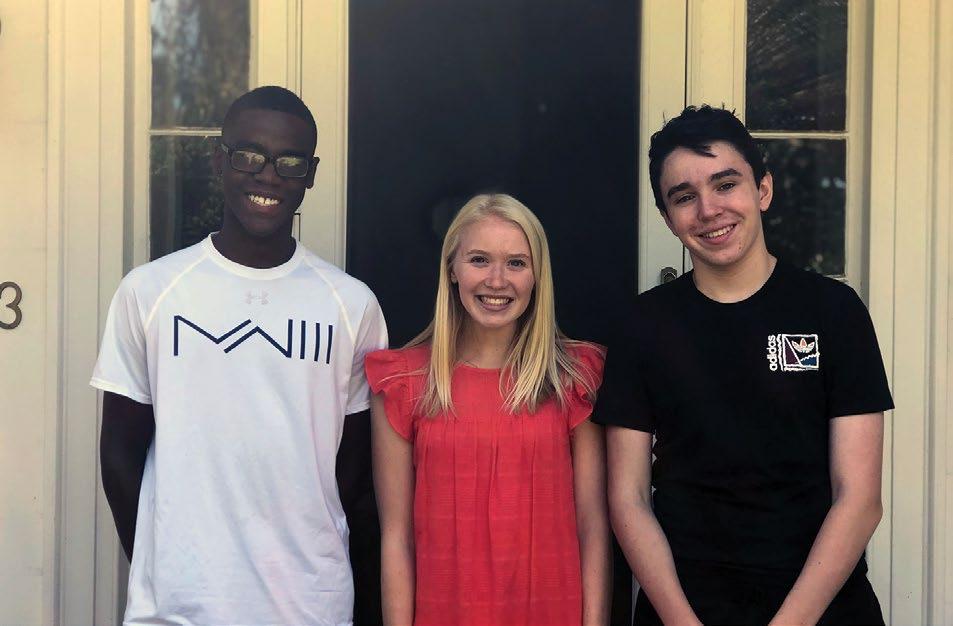
3 minute read
Alumni Profile
from DCD Bulletin 2019-20
by Leslie Bowen
Whitney Hunter-Thomson ‘98
by Lily Bowen ‘07
Advertisement
Whitney Hunter-Thomson ’98 Channels Lessons from Tim Jackson, DCD, to Help Organizations Succeed and Generate Global Social Change
Whitney Hunter-Thomson ’98 has carved out a unique and successful position for herself as an independent business and strategy consultant, advising both nonprofit and for-profit organizations to be more efficient, achieve maximum growth, and shape their leadership ranks. She is an asset to her clients due to her ability to challenge conventions, think outside the box, and embrace uncertainty, among other traits.
When reflecting on her journey to this point in her career, Whitney attributes many of the qualities that have propelled her forward, such as her commitment to improving her community and lifting others up, to her education at DCD. In addition, she cites the mentorship she valued from longtime and beloved DCD employee, Tim Jackson, who she and classmates fondly referred to as “Mr. J.” While Mr. Jackson had transitioned to the role of business manager before Whitney rose to the upper school, he affected her character, and many others, in a way that transcended the four walls of a classroom.
“Mr. J. was committed to drawing the best-possible character out of each student,” Whitney said. “Even after his time as a teacher, he was a presence around the halls,” she added, “and he wasn’t afraid to confront you about an action he didn’t like. Sometimes these were difficult conversations, but they were critical to building a safer and stronger community.”
Whitney and her two sisters, who are also DCD alums, Colby (’91) and Kristin (’95), recently shared memories of Mr. Jackson as a teacher and a close family friend. Kristin recalled a time when she and a friend were chatting during math class and Mr. Jackson scolded them: “As a member of this classroom, it’s your responsibility to help your fellow classmates to learn and understand the material, even if you already know it,” she recalled him saying. “This was a pervasive lesson from Mr. J.—and from all leaders and teachers at DCD—we are in this together; we are learning together; we are growing together,” Whitney added. In many ways, Whitney believes this culture was driven by the school curriculum’s seamless transition from the classroom to the sports field, from woodshop to the performing arts stage, and beyond. “You were in it together with your fellow classmates in every facet of the day,” she said, “and you trusted each other to give every learning opportunity 100 percent.”
This sense of community also informs her role as Chair of the Board of Directors of Atlas Corps, a global nonprofit organization with a mission to address critical social issues by developing leaders, strengthening organizations, and promoting innovation through an overseas fellowship of skilled nonprofit professionals. Founded in 2006 and based in Washington, D.C., Atlas Corps engages leaders committed to the nonprofit sector in 12- to 18-month, professional fellowships at organizations to learn best practices, build organizational capacity, and return home to create a network of global changemakers. Whitney works closely with fellow board members to drive the organization’s strategic direction for the future.
“I’m proud to support an organization that embodies so many of my values,” Whitney said. “Atlas Corps is taking action to increase diversity in the U.S. workforce, while also equipping these individuals with skill sets that will broaden their professional opportunities and increase the reach of nonprofits in their home countries.”
Whitney’s passion for giving back has also greatly benefited DCD over the years, through her volunteer leadership and other contributions. In particular, Whitney has served in a number of volunteer roles since graduating, including as a field hockey coach, member of the Alumni Council, and as Alumni Annual Fund Chair. As Whitney demonstrates, at any organization, alumni and volunteers are an invaluable resource who serve to embody the importance of community.



